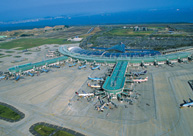For Logistics Hub in N.E. Asia
Incheon Int'l Airport to have third runway, support facilities expanded soon
 Korea will be ready to play its envisioned role as a logistics hub in Northeast Asia in 2010, the Ministry of Construction and Transportation announced recently.
Korea will be ready to play its envisioned role as a logistics hub in Northeast Asia in 2010, the Ministry of Construction and Transportation announced recently.
Lee Seong-kwon, director-general of the Logistics Reform Headquarters of the MOCT, said the ministry will focus on measures to reduce logistics expenses for business firms and enhance their competitiveness in logistics. He said logistics infrastructure will be expanded with its services made more competitive, while various policies that make up foundations for logistics policies will be streamlined.
In the center of the ministry's vision for logistics expansion is the development of the Incheon International Airport as a hub airport in Northeast Asia, taking advantage of its geographical location. The airport is located in the center of 43 cities with over 1 million population within the distance of 1,000 km, and it is in a position to play a role of connecting sea lanes in North Pacific and the high ways crossing the Russian Siberia. The airport and its approach transportation facilities will be expanded to create new demand for the airport.
The airport's cargo handling reached 2.14 million tons per year in the past five years of its opening, ranked 3rd in the world and passenger handling totaled 26 million per year, putting it in the 10th place in the world. The airport will have its third runway and its cargo terminal expanded by 30,000 pyeong with the addition of 2.5 million pyeong in land. The airport's cargo handling capacity will be increased to 4.5 million tons annually from the current 2.7 million tons. Airport approach facilities such as Incheon Grand Bridge and railroad will be built as soon as possible. The logistics area around the airport will be developed as a free trade area.
The airport logistics complex taking up 300,000 in space has begun operation from March and the cargo terminal with 330,000 pyeong will be open in the first half of this year. In addition, the ministry has been considering opening an international business area near the airport.
 Under consideration are the construction of a convention center, and a theme park to attract people to the airport.
Under consideration are the construction of a convention center, and a theme park to attract people to the airport.
The ministry also plans to attract additional international carriers to make stops at the airport. The number of international air routes will be expanded to 266 this year from 255 at the end of last year. Also under the plan is the simplification of checks on incoming passengers with the number of foreign carriers projected to increase to around 70 by 2010 and with 290 international flight routes.
The ministry also plans to develop Busan and Gwangyang Harbors into mega hub ports in Northeast Asia taking advantage of their superior locations as hub container transfer ports, good enough to be a gateway to Europe, servicing containers from north China and west Japan. Their facilities will be expanded along with a plan to attract global logistics companies to set up operations in the port support areas. At the new Busan Harbor, three new container wharfs were opened and three more will be opened by the end of this year. The number of container cranes will be increased to average three and half cranes per container wharf from three cranes per container wharf.
By 2008, the support area for the port will be expanded to 430,000 pyeong with 220,000 pyeong to be expanded this year, in addition to the construction of new railroads and roads to connect the support area.
Gwangyang Harbor will also have four new container wharfs by the end of this year to be able to cover 16 berths. The support area of the port will also be established to the tune of 120,000 pyeong with a joint logistics center, railroads, roads, and other transportation facilities built in the area.
By 2010, the ministry plans to build inland cargo terminals in the five regions across the country. The Capital Area will have a new logistics center in Gunpo and a sub-logistics area to be built in Paju, north of Seoul. A two-stage work is being undertaken for a logistic complex in Janseong, South Jeolla Province, with logistics centers to be built in Yeongi and Cheongwon in the province. A logistic center will be built in Chilgok, North Gyeongsang Province. nw
Lee Seong-kwon, director-general of the Logistics Reform Headquarters of the Ministry of Construction and Transportation.
A view of Incheon international Airport passenger boarding terminals.
3Fl, 292-47, Shindang 6-dong, Chung-gu, Seoul, Korea 100-456
Tel : 82-2-2235-6114 / Fax : 82-2-2235-0799